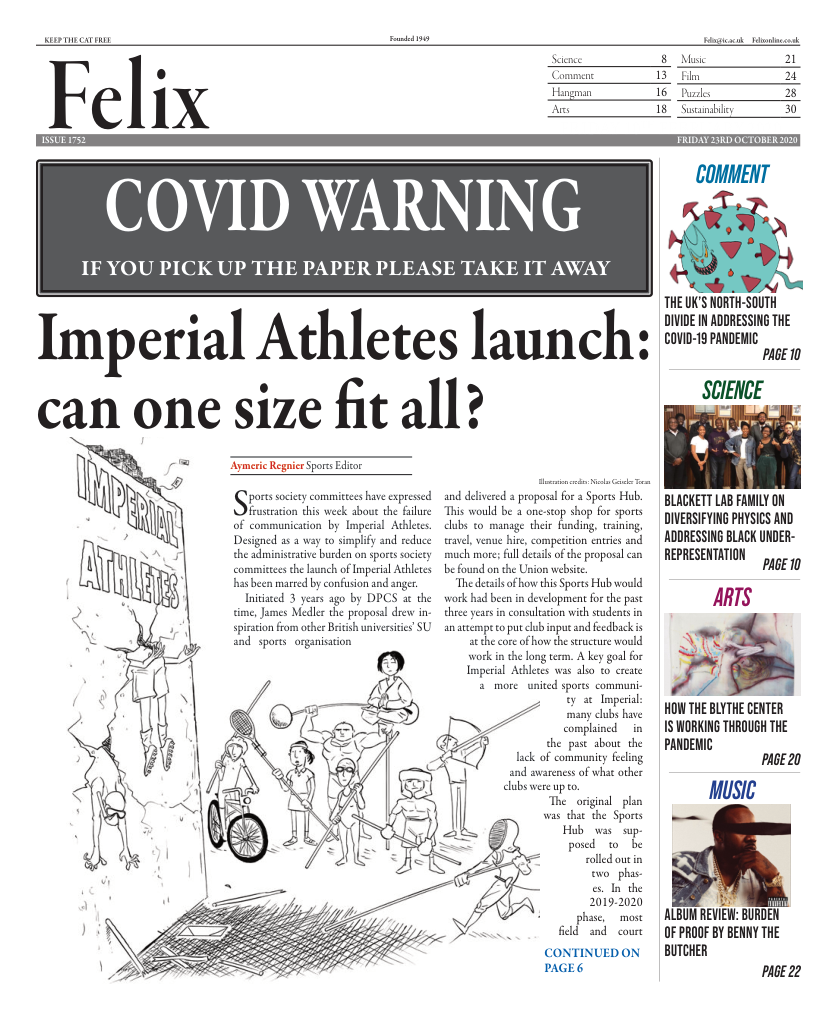COVID-19 and the North-South divide
The Vice President and Regalia Officer of the new Imperial College Northern Society talks about why the North feels like it is being neglected during the pandemic.
Many of us will have heard of ‘the North-South divide’ in casual banter and passing conversation, usually between a Mancunian with no personality and an Essex boy. This includes but is not limited to: ‘Reading is way better than Leeds’, ‘why does everyone get offended in the South?’ or ‘mate, why are you drinking a mug of gravy?’.
Despite its superficial appearance, there is an overwhelming amount of evidence to suggest the North-South divide cuts deep into the UK’s health, social and economic systems, putting northerners at a significant disadvantage. This may be best exemplified through the government’s management of COVID-19.
As you have probably heard by now, London has been moved to Tier 2 on BoJo’s 3-Tier system. This news probably came to your dismay; no more gatherings of six indoors? Restaurants closed at 10pm? No meeting anybody outside your house or support bubble? It’s a nightmare!
What you may not know is that Manchester has been fighting to remain in this tier, with the government imposing Tier 3 on its Merseyside neighbour Liverpool with threats of similar fates for the football capital. Tier 3 means no mingling with anybody outside your house or bubble at all, be it in your gran’s tea room or the beautiful (and very safe) parks that Liverpool has to offer; conversely, you can still get a carvery dinner and a pint in your local harvesters surrounded by 100s of strangers provided that your table of 6 is within your support bubble or household.
The ramifications of a Tier 3 lockdown are quite dire. On a social level a lot of people will be locked back up in their tiny claustrophobic houses – many without gardens - unable to socialise with their friends, work out in the gym or have a pint in the pub (the last option a fair sacrifice in my opinion). Economically, Liverpool will trundle to a halt with most of the service sector out of business and it may not recover causing the loss of many independent stores, restaurants and venues.
One may argue that the reason Liverpool has been put into Tier 3 is because COVID-19 transmission is higher there and as a result, restrictions must be tighter; of course, this is true but the root cause for this high transmission rate isn’t Liverpool’s fault. When Eat Out to Help Out (EOTHO) started, us Londoners were ecstatic; on the first day I got a starter, ramen and a large juice from Waga’s for under a tenner, my life may have peaked there to be honest. It was a great time for everybody in the UK, we basked in the 30-degree summer heat, people were out and about, restaurants and pubs were open, lockdown must have ended right? If the government are literally paying for us to eat out then surely we must be in the clear? This may have been true for London; by its nature, London had a high peak at the start of the pandemic and quickly dropped to a more manageable level but this wasn’t the case for smaller cities though; these had a smaller initial peak, but the drop wasn’t as rapid and cases were sustained for longer.
The government decided to implement EOTHO to bring money back into the economy and get the service sector moving again because the faster this happened, the faster the UK could recover from the pandemic; in principle this is a good idea, we can’t exactly stay in lockdown until we have a vaccine, then expect the economy to be unaffected in the system we operate in. The reason this scheme may have set the UK back, according to the Mayor of Greater Manchester, Andy Burnham, is that it operated strictly on a London timeline. As soon as London got to a manageable death rate, they implemented EOTHO but the smaller cities like Manchester, Liverpool and Leeds still didn’t have a stable death rate so were in a much more precarious position than London. As a result, the citizens of these cities ventured out to pubs and to restaurants and since the government told them they were safe, they slowly let their COVID guards down. People mingled and the virus slowly but surely started working its way through the population, leading us to where we are now.
There is no hiding the fact that the North is being disproportionately affected by the pandemic; the North East and West have the highest hospital admissions per 100,000 and positive/negative test ratio of anywhere in the UK and it isn’t just the London-centric management plan that caused this. If you look at the variables dictating whether a region will handle a pandemic such as COVID-19’s well, the North has definitely drawn the short straw; the North is poorer, its demographics are more vulnerable, its people are more likely to live in urban areas than in rural and according to the ONS (Office for National Statistics), its industries force more people to go out and work as opposed to working from home. This cocktail of risk factors predisposes the North to vulnerability and when the government doesn’t prioritise this, it is easy to see why places like Liverpool have been shoved into Tier 3. It is also clear that this isn’t a sustainable management plan.
Two main factors affecting regional burden of COVID-19 are how urban the area is and how deprived the area is. If we look at London, it is almost 100% urban (hence the huge initial rise in cases) but according to the ONS, “jobs based in workplaces in London and the South East are much more likely to be possible to do from home compared with the rest of the UK, probably due to a higher proportion of professional occupations in the region”, (hence the rapid, early decline in cases).
If we look at the rest of the South as a whole, it is more rural and less deprived meaning that the burden will be lower. If we look at the North there is definitely more deprivation, but this is okay in rural areas since transmission is lower but in cities and towns where the population is urban, COVID-19 can spread rapidly without adequate intervention, infrastructure and management to stop it.
If the North-South divide isn’t addressed, there will always be health, social and economic inequality and a large proportion of the population will not reach their true potential due to the area they were born in. There are a lot of problems in the UK and these are definitely exacerbated by COVID-19 but maybe the silver lining of this pandemic is that we can highlight and address the massive inequalities present in the UK which include but are by no means limited to the North- South Divide.





